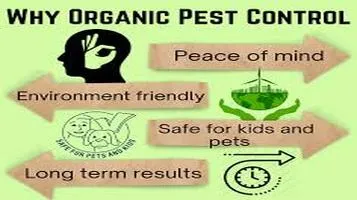Exploring the Efficacy and Benefits of Organic Pest Control Methods
Organic pest control methods focus on managing pests using natural and environmentally friendly techniques. These methods prioritize maintaining ecological balance and reducing harm to beneficial organisms, humans, and the environment. Common strategies include cultural controls, such as crop rotation and companion planting, which deter pests by disrupting their life cycles. Biological controls involve introducing natural predators or parasites, like ladybugs or nematodes, to manage pest populations. Mechanical controls, such as traps and barriers, physically prevent pests from accessing plants. Additionally, organic pesticides derived from natural sources, such as neem oil or diatomaceous earth, offer targeted pest management. These methods collectively promote sustainable agriculture by minimizing chemical use and enhancing soil health and biodiversity.

In recent years, the demand for organic pest control methods has surged, driven by increased awareness of environmental sustainability and health-conscious living. Organic pest control methods are designed to manage pests such as insects, rodents, and other unwanted creatures using natural substances and practices. These methods stand in stark contrast to conventional chemical-based pest control, which often relies on synthetic pesticides and herbicides. This review delves into the effectiveness, benefits, and potential drawbacks of organic pest control methods, offering a comprehensive overview for those considering a shift towards greener alternatives.
Effectiveness of Organic Pest Control
The effectiveness of organic pest control methods can vary depending on several factors, including the type of pest, the environment, and the specific methods employed. Generally, organic pest control can be highly effective when integrated into a comprehensive pest management plan that includes preventive measures, routine monitoring, and targeted treatments.
One of the most commonly used organic pest control methods is the application of botanical insecticides, such as neem oil, pyrethrin, and diatomaceous earth. Neem oil, derived from the seeds of the neem tree, has been praised for its ability to disrupt the life cycle of pests by acting as an insect growth regulator. Pyrethrin, extracted from chrysanthemum flowers, has a rapid knockdown effect on insects but degrades quickly, reducing long-term environmental impact. Diatomaceous earth, a powder made from fossilized algae, works by dehydrating insects upon contact.
Biological control is another effective organic method, involving the introduction of natural predators or parasites to control pest populations. For instance, ladybugs and lacewings are often released to combat aphid infestations, while parasitic wasps can target caterpillar pests. Additionally, microbial insecticides like Bacillus thuringiensis (Bt) produce toxins that are lethal to specific insect larvae but harmless to humans, pets, and beneficial insects.
Benefits of Organic Pest Control
The benefits of organic pest control methods extend beyond mere pest eradication, encompassing environmental, health, and economic advantages.
1. Environmental Sustainability: Organic pest control methods promote ecological balance by minimizing the disruption caused by synthetic chemicals. Conventional pesticides often have broad-spectrum activity, affecting non-target species such as pollinators, birds, and aquatic organisms. In contrast, organic methods tend to be more species-specific and biodegradable, reducing the risk of bioaccumulation and environmental contamination.
2. Human and Animal Health: The use of organic pest control methods significantly reduces exposure to toxic chemicals that can have detrimental health effects. Pesticide residues on food products, water contamination, and indoor air quality are critical concerns associated with chemical pesticides. Organic methods, which rely on natural substances, are generally considered safer for humans, pets, and wildlife.
3. Sustainable Agriculture: For farmers and gardeners, organic pest control is an integral component of sustainable agriculture practices. By avoiding synthetic inputs, soil health is preserved, and beneficial organisms such as earthworms and soil microbes thrive. This leads to improved soil fertility, water retention, and crop yields over the long term.
4. Economic Viability: While the initial cost of organic pest control products may be higher than their chemical counterparts, the long-term economic benefits can be substantial. Reduced dependency on chemical inputs, improved crop resilience, and the potential for premium pricing on organic produce contribute to the overall economic viability of organic pest control.
Potential Drawbacks and Challenges
Despite the numerous benefits, organic pest control methods are not without their challenges and limitations. One of the primary concerns is the variability in effectiveness. Organic methods often require a higher degree of knowledge and precision to implement successfully. Factors such as timing, environmental conditions, and pest population dynamics can influence the outcome, necessitating continuous monitoring and adaptation.
Additionally, organic pest control methods may have a slower action compared to synthetic pesticides, requiring patience and persistence. For instance, biological controls may take time to establish and become effective, and repeated applications of botanical insecticides might be necessary. This can be particularly challenging in situations where rapid pest elimination is critical.
Moreover, the availability and cost of organic pest control products can be limiting factors. While the market for organic products is growing, accessibility can still be an issue in certain regions. Furthermore, the initial investment in organic pest control practices, such as purchasing beneficial insects or setting up traps, might be higher than traditional methods.
Conclusion
Organic pest control methods offer a promising alternative to conventional chemical-based approaches, aligning with the growing emphasis on environmental sustainability and health. While there are challenges associated with their implementation, the benefits in terms of ecological balance, human and animal health, sustainable agriculture, and long-term economic viability make them a worthwhile consideration. By integrating organic pest control into comprehensive pest management strategies, individuals and communities can contribute to a healthier, more sustainable future.






